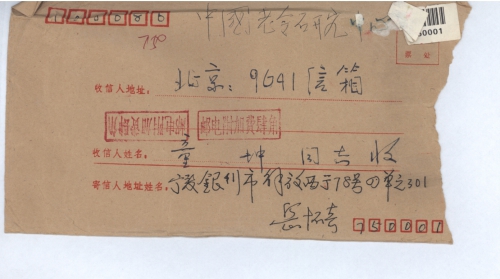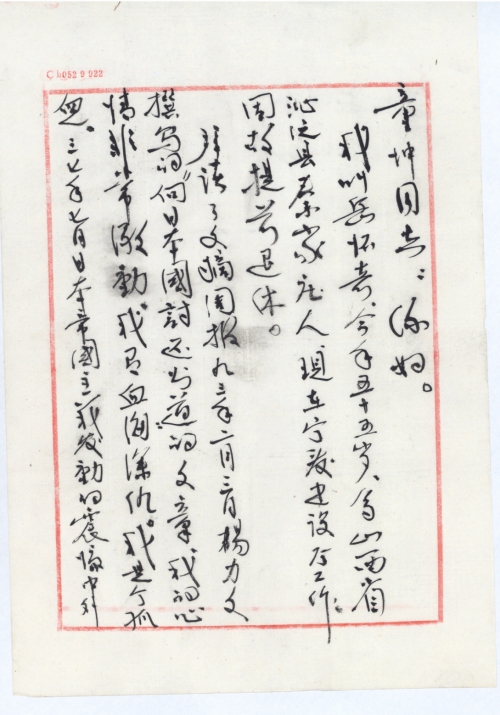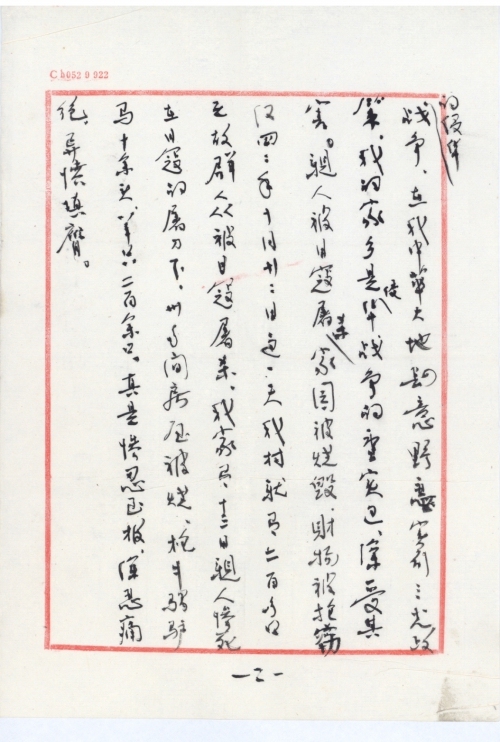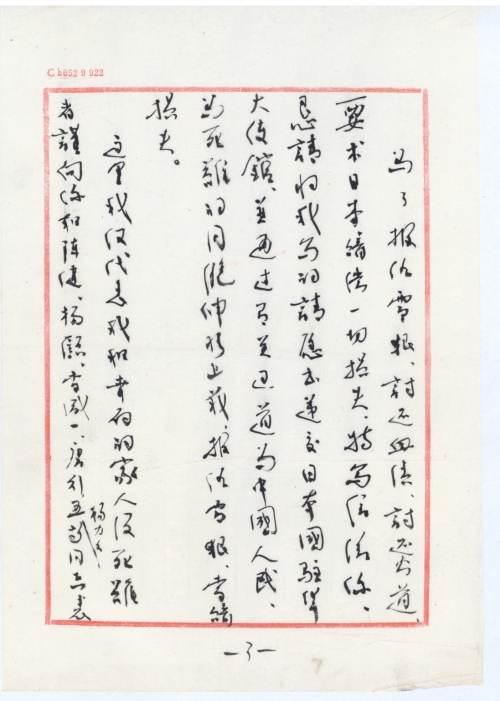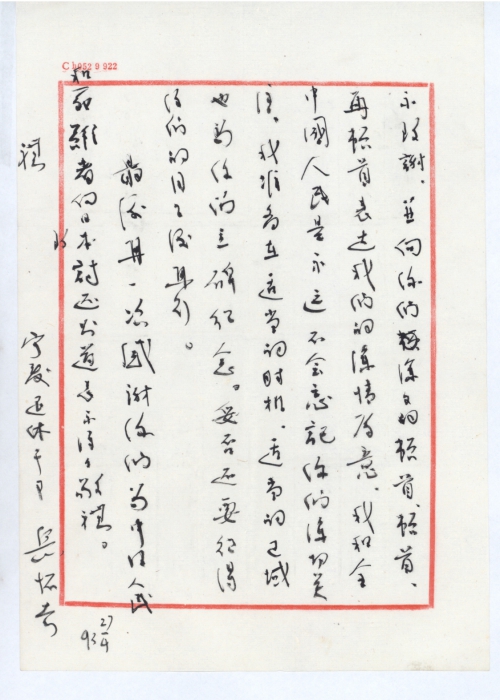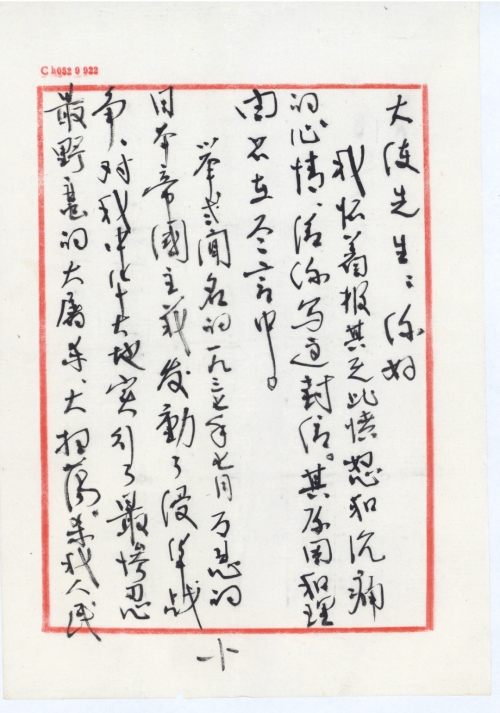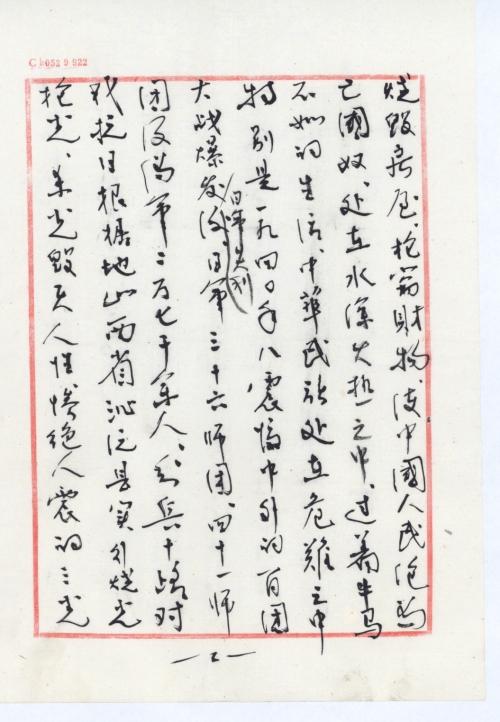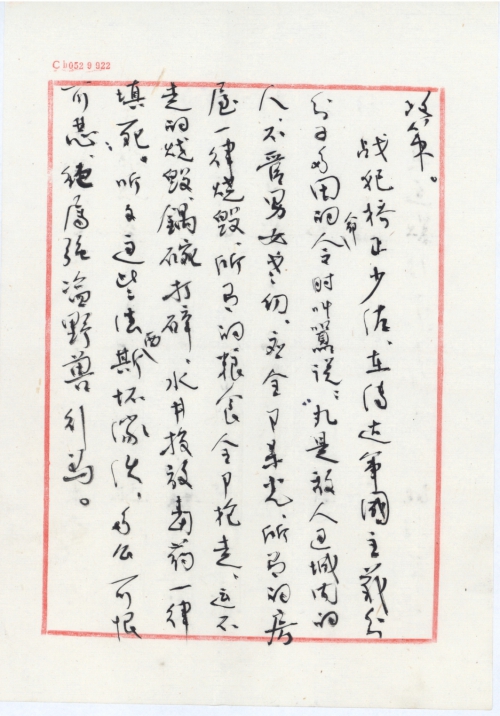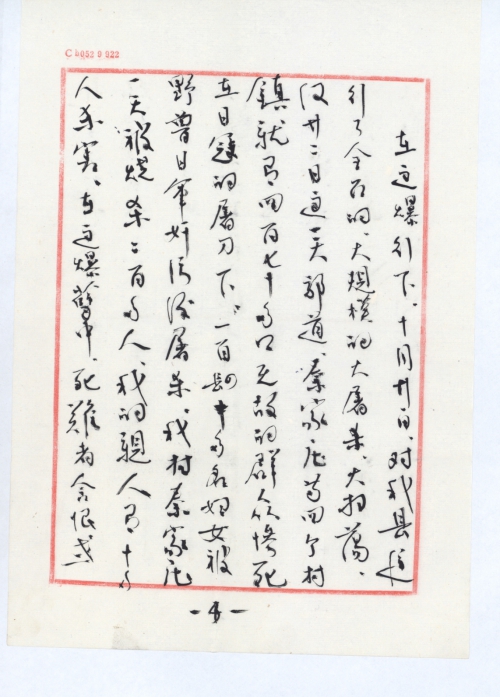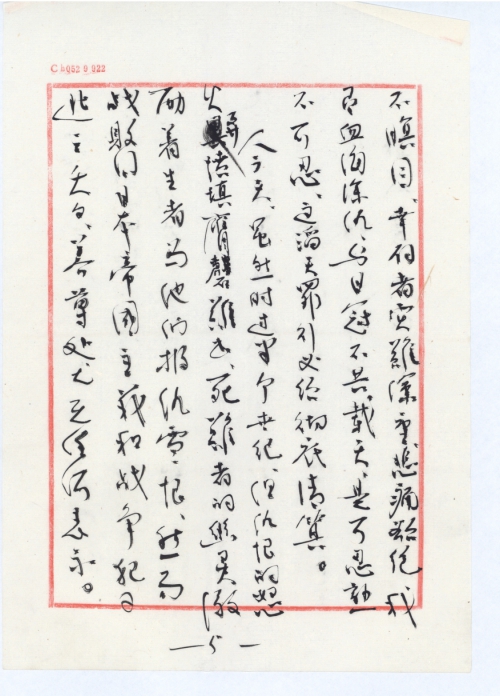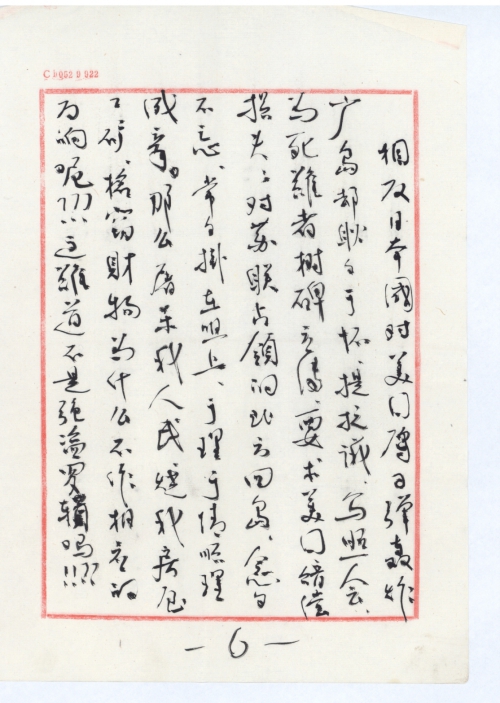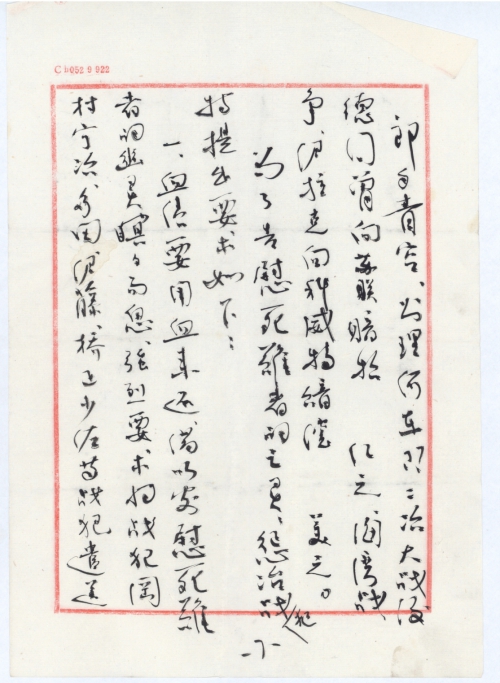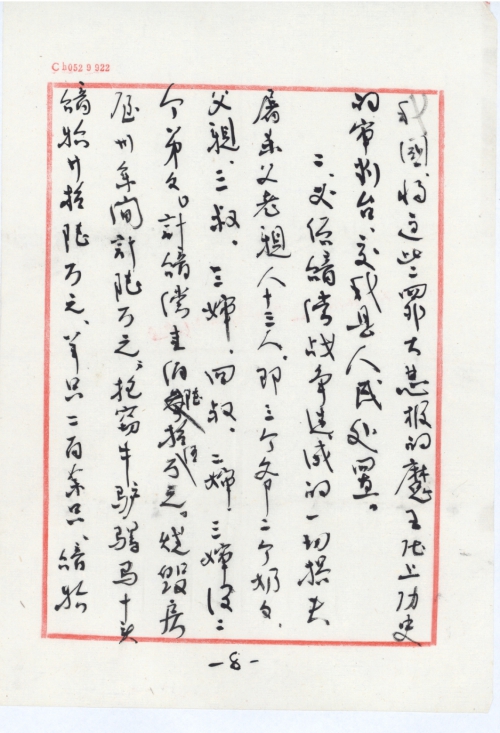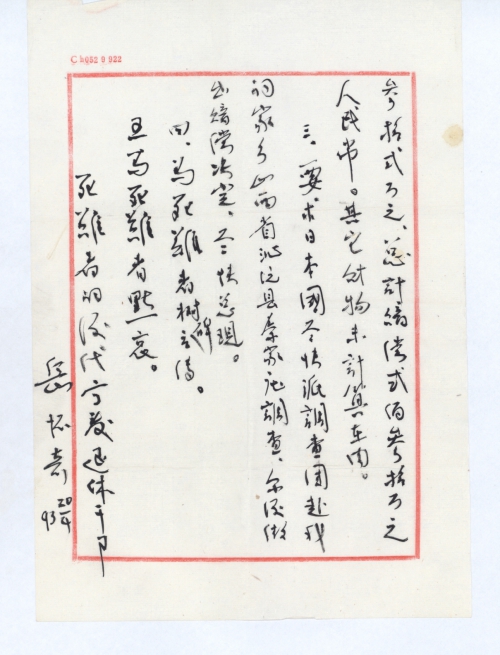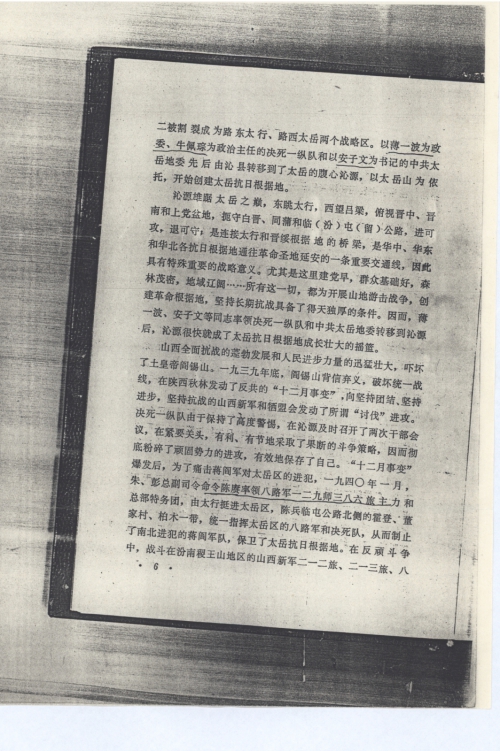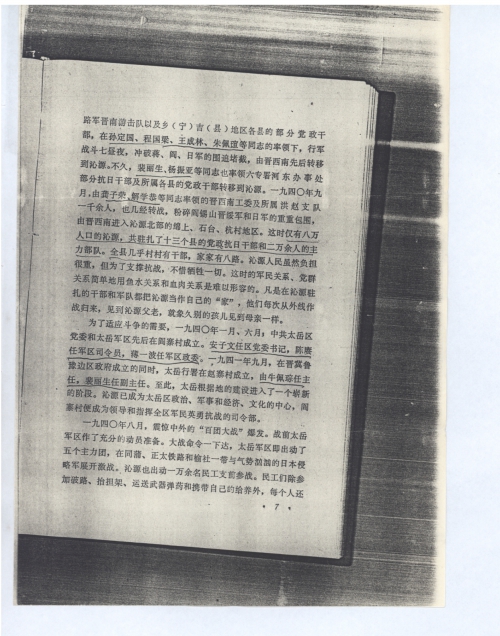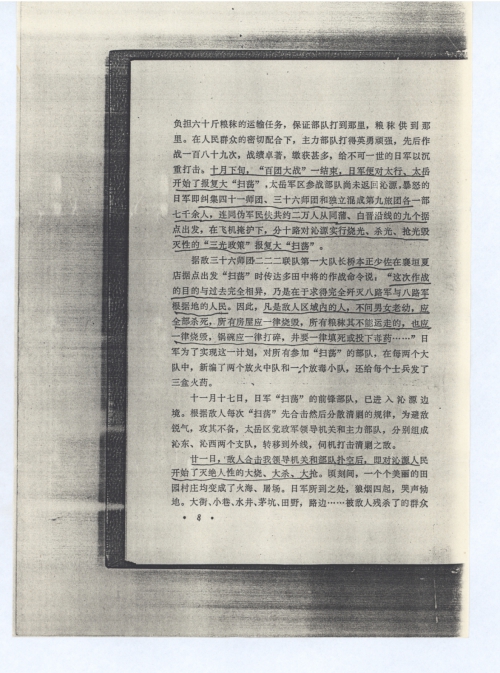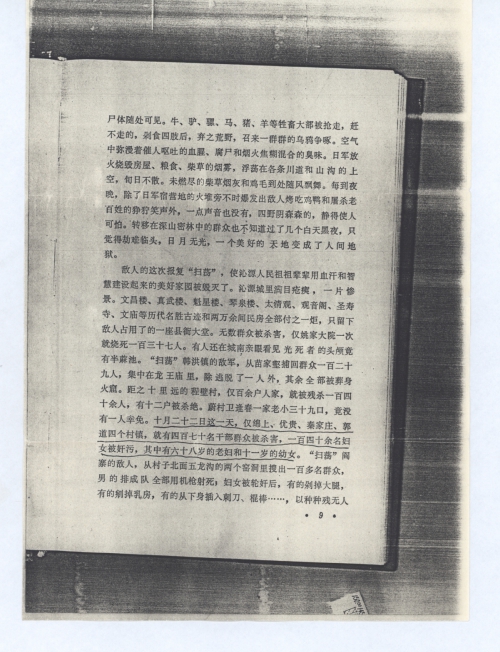Date of letter:1993-04-20
Address of author:Yinchuan City, Ningxia
Date of event:1937-07
Location of event:Qinshui County, Jincheng City, Shanxi Province
Name of author:Yue Huaiqi
Name(s) of victim(s):Many people
Type of atrocity:Other Massacres, Murders, Rapes, Others(OM, MU, RA, OT)
Other details:The evil Japanese imperialism launched the war of aggression against China, and committed a series of massacres, murder, rape and other acts of cruelty.
Comrade Tong Zeng:
How have you been?
I am Yue Huaiqi, 55 years old, born in Qinjiazhuang, Qinshui, Shanxi. I worked in the Book Design Office of Ningxia and retired early due to some reason.
I’ve read the article titled Pursuing Justice against Japan by Yang Liwen from Weekly Digest of February 3, 1993. It has made me very agitated because I am an orphan with abysmal bloody hatred for the invading Japanese army. On July 7, 1937, the Japanese imperialists launched the war of aggression against China that shocked the world. The invading Japanese army implemented the brutal “Three-Alls” Policy (kill all, burn all and loot all) on our land, and my hometown was among the most ravaged places. My families were killed, houses burned and property robbed. On the day of October 22, 1942, over 200 innocent people in our village were massacred by the Japanese soldiers. As far as my family was concerned, 13 relatives were killed, over 30 houses burned, over 10 cattle, mules, donkeys and horses and over 200 sheep were robbed. What an extremely cruel act! My heart is filled with utter abhorrence and raging condemnation!
To revenge the injustice and settle the bloody debt, I demand Japan to compensate for all my losses. That’s why I am writing to you and sincerely asking you to submit my petition to the Japanese Embassy in China and pursue justice for Chinese victims through related channels.
Here I’d like to express gratitude to you and other comrades including Chen Jian, Yang Yuan, Li Chengyi, Tang Yinwu and Yang Liwen on behalf of my family members, both dead and alive. The Chinese people over all the country will never forget your concern for us. I am planning to build a memorial for you in a proper place at a proper time. But I need your approval first.
Thank you again for pursuing justice for Chinese people and dead victims against Japan.
Yours faithfully,
A retired cadre from Ningxia
Yue Huaiqi
Mr. Ambassador:
I am writing to you in an indignant and painful mood for self-evident reasons.
The evil Japanese imperialism launched the infamous war of aggression against China in July 1937, carrying out the most cruel and barbaric raid and massacre on our vast land. You killed our people, burned our houses, and robbed our property, creating a living hell in which the Chinese were treated worse than livestock as slaves without nation . To retaliate the shocking setback of Japanese army in the world-renowned battle of Hundred Regiments Offensive in 1940, the Japanese Thirty-Sixth Army, the Japanese Forty-One Army and the puppet army, a total of 27,000 people in ten divisions, implemented the extremely savage “Three Alls” Policy (kill all, burn all and loot all) in Qinyuan, Shandi, an anti-Japanese base.
While conveying the order of militarism activist Tada, the war criminal Major Hashimasa shouted that, “All people, men and women, young and old, must be killed, all houses must be burned down, all food must be taken away, those that cannot be taken away must be burned and smashed, and all wells must be poisoned or blocked.” Listen to these fascist bastards. How abominable, pathetic, barbaric beasts!
On October 21, the invading Japanese army launched a massive massacre and raid in my county. On that day alone, over 470 innocent people from four villages including Guodao and Qinjiazhuang were cruelly killed by Japanese soldiers. Over 140 women were raped and killed. Over 200 people from Qianjia Village were burned and killed, including over 10 relatives of mine. What a devastating tragedy for both the dead and survivors. I will never forget the hatred and vow to revenge the huge debt of blood. The invading Japanese army’s heinous crimes must be thoroughly punished.
Although half a century has passed, the fiery fire of hatred still rages in my heart. The ghosts of the dead are inspiring the survivors to revenge for them. But the Japanese imperialism and war criminals were still at large and showed no remorse.
In contrast, Japan protests about the US’s atomic bombing of Hiroshima, building memorials for the dead and demanding compensation from the US. Japan also talks a lot about the northern four islands occupied by the Soviet Union. By the same token, how come Japan brushes off its own killing of our people, burning of our houses, and robbing of our properties? Isn’t this the self-contradictory logic of robbers? Where is justice in broad daylight? After the World War II, Germany compensated the Soviet Union XX USD and after the Gulf War, Iraqi compensated Kuwait XX USD.
To solace the souls of the dead and punish war criminals, I hereby make the following demands:
1. The blood debts must be paid off by blood to make the souls of the dead rest in peace. I strongly demand that war criminals such as Okamura Yasuji,Tada, Ito and Major Hashimasa should be sent back to China, tried in the court of history, and judged by the people of my county.
2. All my losses caused by the war must be compensated. 13 of my relatives were killed including 3 grandfathers, 2 grandmothers, my father, third uncle, third aunt, fourth uncle, second aunt, third aunt and 2 younger brothers, which shall be compensated 1.65 million yuan. Over 30 houses were burned, which shall be compensated 60,000 yuan. Over 10 cattle, mules, donkeys and horses were robbed, which shall be compensated 260,000 yuan and over 200 sheep were robbed, which shall be compensated 320,000 yuan. So, the Japanese government shall compensate me a total of 2.3 million yuan. Other properties are not included.
3. I demand Japan to promptly send an investigation team to my hometown Qinjiazhuang, Qinyuan, Shanxi to facilitate the investigation and compensation.
4. To build memorials for the dead.
5. To mourn for the dead.
Retired cadre from Ningxia and descendant of the victims
Yue Huaiqi
April 20, 1993
Two strategic areas-East Taihang and West Taiyue were formed. The First Daredevil Army led by political commissar Bo Yibo and political director Niu Peicong and the Taiyue Prefectural Committee of the CPC led by the secretary An Ziwen were shifted from Qin to Qinyuan, the heart of Taiyue and established the Taiyue Anti-Japanese Base based on Taiyue Mountain.
Qinyuan, located on the top of Taiyue Mountain, was to the west of Taihang, to the east of Lvliang and above Jinzhong, Jinnan and Shangdang Basin with Baijin, Tongpu and Linfen-Tunliu roads passing through it. It was a good strategic place for attack and defense. It’s also a bridge connecting Taihang Base and Jinsui Base and an important transport system connecting anti-Japanese bases in middle, eastern and northern China to the revolutionary site Yan’an. So, it was a place of special, important strategic significance. Besides, the Communist Party developed a good relationship with the common people because it established a base there at an early time. Moreover, the area was vast with dense forests. All these have provided unique advantages for carrying out a mountain guerrilla warfare, establishing a revolutionary base, and fighting a long-term war. Therefore, after comrades including Bo Yibo and An Ziwen led the First Daredevil Army and the Taiyue Prefectural Committee of the CPC to Qinyuan, Qinyuan soon became a cradle for the growth of the Taiyue Anti-Japanese Base.
The prosperity and progress of the Shanxi’s comprehensive anti-Japanese war scared the local warlord Yan Xishan. At the end of 1939, Yan Xishan betrayed the United Front (a coalition of the Nationalist Party, the Communist Party and other mass organizations) and launched the December Incident in Qiulin, Shaanxi by attacking the Shanxi New Army and Sacrifice Ally that upheld unity, progress and fight. Thank to high vigilance, the First Daredevil Army promptly held two cadre’s meetings in Qinyuan and took a bold beneficial military strategy at the urgent moment to completely crush the attack from stubborn forces and effectively protect themselves. After the December Incident, as a response to the attack of the Chiang Kai-shek and Yan Xishan Army in January 1940, deputy general commanders Zhu De and Peng Dehuai commanded Chen Geng to lead the main forces of the No. 386 Division of the No. 129 Eighth Route Army and the Spy Division Headquarters from Taihang to Taiyue and to command the Eighth Route Army of Taiyue and the First Daredevil Army to fight near Huodeng, Dongjiacun and Baimu to the north of the Chenbing-Lintun Road, thus stopping the attack of the Chiang Kai-shek and Yan Xishan Army and safeguarding the Taiyue Anti-Japanese Base. During the battles against stubborn forces, the No. 212 Division and No. 213 Division of the Shanxi New Army and the Jinnan guerrilla of the Eighth Route Army fighting in Jiwangshan, Fennan and some party and administrative cadres in Xiangning and Jixian were shifted from Jinxi and Jinnan to Qinyuan under the guide of comrades such as Sun Dingguo, Cheng Guoliang, Wang Chenglin and Zhu Peixuan by fighting the Chiang Kai-shek and Yan Xishan Army and the Japanese army for seven days and nights. Not long after that, comrades including Pei Lisheng and Yang Zhenya led some anti-Japanese cadres of Six Hedong Agency Office and party and administrative cadres of different counties to shift to Qinyuan. In September 1940, over 1,000 people from the West and South Shanxi Working Committee and HongZhao Branch were led by comrades such as Gong Zirong and Xie Xuegong to shift from West Shanxi and South Shanxi to places in north of Qinyuan such as Mainshang, Shitai and Hangcun by fighting against Yan Xishan’s Shanxi and Suiyuan Army and the Japanese army. Then, Qin Yuan with a population of 80,000 people was stationed by party and administrative cadres from 14 counties and over 20,000 main forces. Almost each village of the county had a cadre and each family had a solider from the Eighth Route Army. The people of Qinyuan were under huge burden, but they sacrificed all to support the battle. At that time, the relationship between the military and people and the party and mass was more than that of water and fish, blood and flesh. All cadres and soldiers that were stationed in Qinyuan regarded it as their home. Every time when they came back from fighting the war and met the people of Qinyuan, they were like children reunited with their mothers.
To meet the needs of the war, Taiyue Central Party Committee and Taiyue Military Region were established in Yanzhai Village in January and June, 1940 respectively, with An Ziwen as the Party secretary, Chen Geng as the commander and Bo Yibo as the political committee member. In September 1941, Taiyue General Office was established in Zhaozhai Village, with Niu Peicong as the director and Pei Lisheng as the deputy director. With that, the construction of the Taiyue Base entered in a new stage. Qinyuan became a political, military, economic and cultural center of Taiyue and Yanzhai Village became the command headquarters of leading and commanding all soldiers and people to heroically fight the battles.
In August 1940, the well-known Hundred Regiments Offensive took place. Before the battle, the Taiyue Military Region made full preparations. Once the command was given, five main forces were allocated to fight against the invading Japanese army at Tongpu, Zhengtai railway and Yushe. Besides, over 10,000 farmers from Qinyuan also participated in the battle. Apart from damaging roads, carrying stretchers, transporting weapons and bullets and carrying their own supplies, each farmer was given the task of carrying 30 kg forage to support the forces wherever they went. With the close cooperation from the mass people, the main forces fought 189 battles bravely, giving a heavy blow to the Japanese army. In late October after the Hundred Regiments Offensive, the Japanese army began to raid Taihang and Taiyue as revenge. At that time, before the forces could return to Qinyuan, the indignant Japanese army including over 7,000 soldiers from the No. 41 Army, No. 36 Army and independent Ninth Division and about 20,000 people from the puppet army left from 9 bases along Tongpu and Baijin and implemented the Three Alls Policy (burn all, kill all and loot all) in Qinyuan under the cover the planes.
When leaving from the base in Xiadian, Xiangyuan for the raid and conveying general Tada’s commands, Major Hashimasa leader of the No. 1 team of No. 222 Joint Group of No. 36 Army said that, “Different from other battles, the purpose of this battle is to completely kill the Eighth Route Army and the people at the base. Therefore, all people, men and women, young and old, must be killed, all houses must be burned down, all food must be taken away, those that cannot be taken away must be burned and smashed, and all wells must be poisoned and blocked.” To achieve the target, each two major forces had two medium fire teams and one small poison team and each soldier was given three boxes of gunpowder.
On November 7, the Japanese front troops entered the border of Qinyuan. To surprise the enemy, the party, administrative and military leaders and main forces of Tiyue Region were divided into East Qinyuan and West Qinyuan branches and transferred to the outer area to wipe out the enemy. On November 21, after the Japanese army’s attempt to combat our cadres and forces went in vain, they burned, killed and robbed the Qinyuan people. Soon, one after another beautiful villages were turned into flames and slaughterhouses. Flames and cries followed wherever the Japanese army went. People’s corpses were everywhere – the streets, alleys, wells, latrines, fields and roadsides. Most of the livestock such as cattle, donkeys, mules, horses, pigs and sheep was robbed and the rest were cut off limbs and thrown to the woods, attracting crows. The air was filled with a mixed nauseous stench of blood, rotten corpse, and smoke fumes. The smoke from the burning houses, food and firewood floated in the air above the creeks and valleys, lingering for days. At night, not a sound was heard except for the occasional outburst of horselaughs from the Japanese enemy’s camp fire sites while roasting chickens and ducks or killing the civilian. The silence was terrible. In utter horror of such calamity, those villagers hidden in the woods had lost track of how many days and nights had transpired. A beautiful place was turned into a hell.
The retaliatory campaign of the enemy had destroyed the beautiful homeland built by Qinyuan people from generation to generation with blood, sweat and wisdom. What a tragic sight in Qinyuan! Historic sites such as Wenchang Tower, Zhenwu Tower, Kuixing Tower, Qinquan Tower, Taiqing Temple, Guanyin Pavilion, Shengshou Temple and Wen Temple and over 20,000 resident houses were burned down. Only a county government hall was spared and used by the enemy. Countless people were killed. At the Taojia Yard alone, 137 people were burned. The enemy that raided Hanhong Town captured 129 people from Miaojiahe, gathered them in Longwang Temple and burned them all except one escapee. Five kilometers away was Chengbi Village with only a little over 100 households. But there, over 140 people were killed including 12 families. In Wei Village, Wei Fengchun’s family had 39 members, but not a single one of them survived. On October 22, in four villages (Mianshang, Yougui, Qinjiazhuang and Guodao) alone, 470 cadres were killed and over 140 women were raped, including a 68-year-old woman and an 11-year-old girl. The enemies raiding Yanzhai searched out over 100 people from two caves in Wulong Ditch in the north of the village. The men were placed in a row and shot. The women were gang-raped and then had their legs or breasts cut off, or had their vagina stuffed with bayonets or sticks. Absolutely heinous!














